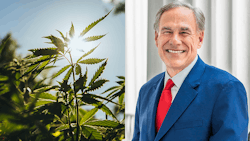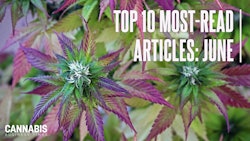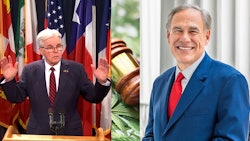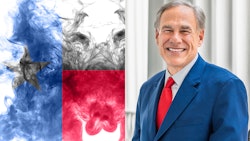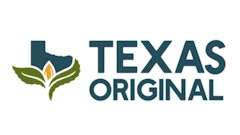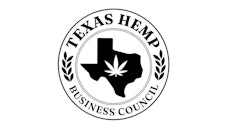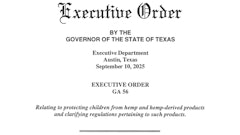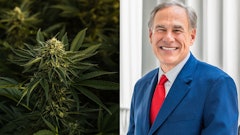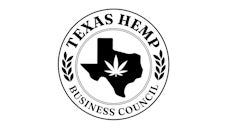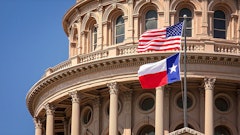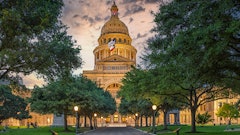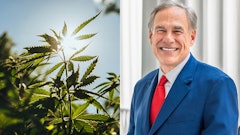
UPDATE: Texas Senate Republicans filed a new bill, Senate Bill 5, to ban the manufacture and sale of products containing hemp-derived THC and other intoxicating cannabinoids, on July 21 in the special session. The legislation, again sponsored by Sen. Charles Perry, R-Lubbock, is nearly identical to Senate Bill 3, which Gov. Greg Abbott vetoed in the regular session. While the bill would ban most cannabinoid hemp products in the Texas marketplace, S.B. 5’s filing says the legislation relates “to the regulation of certain products derived from hemp,” aligning with Abbott’s special session call to “regulate,” not ban, “a lawful agricultural commodity.” The Texas Senate State Affairs Committee is scheduled to hold a special session hearing on S.B. 5 at 9 a.m. CT on July 22 in Austin.
Intoxicating hemp products are back on the chopping block in Texas as the state Legislature reconvened for a special session on July 21 in Austin to tackle 18 issues laid out by Gov. Greg Abbott.
The big question: to regulate or ban?
But whether state legislators can lawfully entertain a broad ban on consumable hemp products containing trace amounts of THC or other intoxicating cannabinoids is up for debate.
According to Article 3, Section 40, of the Texas Constitution, “there shall be no legislation upon subjects other than those designated in the proclamation of the governor calling such session, or presented to them by the governor.”
As it relates to hemp, the only subjects designated by Abbott for this special session deal with legislation to criminalize acts of providing hemp-derived products to children under 21 years old, and to comprehensively regulate hemp-derived products.
That regulation includes limiting potency, restricting synthetically modified compounds, and establishing enforcement mechanisms, “all without banning a lawful agricultural commodity,” as the governor wrote in his July 9 special session proclamation.
While the Texas Constitution may limit state lawmakers from considering a ban in the special session based on the wording of Abbott’s notice, which merely covers the topic of regulation, Lt. Gov. Dan Patrick could double down on his push to ban consumable hemp products with intoxicating compounds.
“It won’t be long before 8,000 smoke and vape shops will be out of business in Texas,” Patrick wrote on X on June 24. “All we have to do is pass S.B. 3, just like we passed during the regular session.”
It’s important to note that while Patrick’s social media post came two days after Abbott vetoed Senate Bill 3, it was well before the governor called the specific subject matters for lawmakers to address in the special session.
Regardless, if the Legislature passes a similar bill to ban hemp in special session, it would go to the governor, who could once again veto or sign it.
During the regular session, Patrick spearheaded S.B. 3’s passage as one of his top priorities. The vetoed legislation had aimed to prohibit manufacturing hemp products containing any amount of a cannabinoid other than nonintoxicating CBD or CBG in what would have been a knock-out blow to an industry that’s had a $10.3 billion economic impact on the state, employing some 50,000 workers, according to Whitney Economics.
While Abbott outlined 18 issues for the Legislature to address, Patrick specifically called out one in the hours leading up to the body reconvening.
“Regulating THC for 21+ in TX is a backdoor way to legalize recreational marijuana,” Patrick wrote Monday morning on X. “Law enforcement is against regulation & supports a full ban. Texas has a robust program for those in need of medical THC for cancer, PTSD, & other issues.”
Furthermore, the lieutenant governor shared an opinion piece that U.S. Sen. Mitch McConnell, R-Ky., wrote July 16 for the Lexington Herald-Leader. Patrick pointed out that McConnell, who spearheaded the federal legalization of hemp in the 2018 Farm Bill, had never intended for intoxicating hemp products to proliferate throughout the U.S. as a result.
Under the 2018 Farm Bill, hemp is defined as containing no more than 0.3% delta-9 THC on a dry-weight basis during a pre-harvest field test. While the federal legislation does regulate finished products, Congress preserved the U.S. Food and Drug Administration’s (FDA) authority to regulate cannabis- and hemp-derived compounds under the Food, Drug and Cosmetic Act (FD&C).
Earlier this month, the Senate Appropriations Committee unanimously approved a fiscal 2026 spending bill that would ban hemp-derived cannabinoid products containing synthetic compounds and/or quantifiable amounts of THC or THCA, or other cannabinoids that have similar effects on humans or animals. As a member of the committee, McConnell said the new language to redefine hemp is necessary to close a “loophole” from 2018.
“My 2018 hemp bill sought to create an agricultural hemp industry, not open the door to the sale of unregulated, intoxicating, lab-made, hemp-derived substances with no safety framework,” McConnell said.
While the 2018 Farm Bill federally legalized hemp by removing it from the Controlled Substances Act, it also provided state autonomy to regulate hemp, and, according to a recent ruling from the U.S. Court of Appeals for the Eighth Circuit, to ban hemp as long as such a ban does not interfere with interstate commerce.
However, being that the Eighth Circuit doesn’t hold jurisdiction in Texas, Abbott and Patrick have collided on the right path forward for the Lone Star State: regulation or prohibition. Specifically, Abbott said in his veto message last month that a ban would take years to implement—similar to the yet-to-be-implemented 2023 ban in Arkansas under the Eighth Circuit—when the issue at hand needs to be dealt with immediately.
“There are … many Texans conducting business responsibly, who invested millions of dollars planting fields or opening up retail stores in reliance on laws making hemp a lawful product to ‘be sold at retail or otherwise introduced into commerce,’” Abbott wrote.
The Texas special session kicked off July 21 with lawmakers tackling Abbott’s call to revise the state’s congressional redistricting plan—a move that could protect Republicans’ slim majority in the U.S. House come the 2026 midterm election. The special session can last for up to 30 days, and it remains unclear how the hemp issue will play out.
While S.B. 3 attracted support from 105 of 108 Republicans across the bicameral Legislature during the regular session, Democratic state Rep. James Talarico accused Patrick of playing a political game to gain that backing. That accusation came on July 18, when Talarico appeared on The Joe Rogan Experience, a popular podcast.
Specifically, Talarico claimed that Patrick blocked House-passed legislation that aimed to establish an emergency response plan for natural disasters like wildfires and floods while also pushing for S.B. 3’s passage in order to protect the alcohol industry.
“[Patrick] held that [House] bill hostage so that he could get his THC ban through,” Talarico told Rogan. “The fact that the lieutenant governor, one, would do the bidding of one industry over the other, two, would hold up literally a lifesaving bill that could have possibly saved lives over the weekend in those floods, just to cater to wealthy special interests, to me, is just an encapsulation of everything that’s wrong with politics.”











